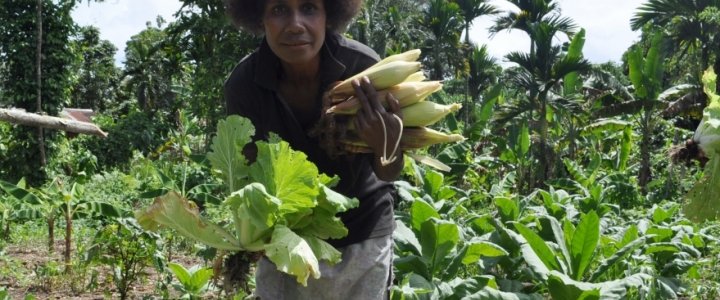As part of our Spotlight on Quality Principle 3, CEO of Live & Learn, and ACFID board member, Christian Nielsen, talks to ACFID about the power of localizing development efforts….and why he cringes when Pacific Island states are referred to as “failing states”.
What does Quality Principle 3 (Sustainable Change) mean to you?
Complying with Quality Principle 3 has transformative implications on the way the we operate at many different levels. Transformational in the sense that it prompts continuous appraisal and reflection on our practice and partnerships. We know that working to change the enabling environment is much more challenging than simply delivering services. It takes sincere partnerships, integrated approaches, and an ability to connect with different levels in society. This requires different skillsets and knowledge to the more traditional roles of NGOs.
As the CEO of Live & Learn, how have you contributed to building up the capacities of your partners and primary stakeholders?
What inspires me is when organisations and individuals come together and acknowledge their strengths and weaknesses in pursuit of a common goal. Having spent most of my career in the Pacific I have seen the power of development approaches that focus on building confidence and connectivity, and that use strengths and attributes that already exist.
In the Pacific we work with more than 500 partners including local schools, health clinics and local institutions, and many of these partnerships stretch over a 10-year period. Localising development efforts and allowing space for people and communities to grow in their own time and over time brings the confidence and sustained capacity that will lead to change that lasts.
How does Live & Learn design initiatives in response to the root causes of poverty and inequity?
We acknowledge the resourcefulness of local partners, indigenous knowledge and local perspectives on what sustainable change looks like. The challenges facing the Pacific can best be addressed by building strength from within and allowing space for local communities and people to lead, localise development solutions and build vertical relationships between communities, and provincial and national governments.
Targeted research underpins such localisation. Designing initiatives based on targeted research is an important component of how Live & Learn designs initiatives that respond to the root causes of marginalisation, poverty and inequality. We have found Australian universities and researchers play a critical role in providing the evidence base leading to targeted development. Research initiatives such as ADRA provide invaluable data and information for good designs.
How has Live & Learn worked with local organisations and primary stakeholders to promote their own development?
Our programming and prioritising is done by our local country offices from a perspective relevant to the challenges that are unique to that country. Partnerships with governments are key – it connects what we do on the ground with the bigger picture. For instance, government partnership is a foundation of our WASH approach. Programs start by aligning with national WASH policies, then building engagement with the right government agencies.
Acknowledgement is also very important. Acknowledgement of what people already know, the strengths they have and the systems that are already in place to drive their own development. We acknowledge strength in others and work from a position of this strength. It always disappoints me when I hear from various sectors that Pacific Islanders are low in capacity and capability – I cringe when I hear Pacific Island states are referred to as “failing states”. Understanding and acknowledging local context should be the basis for any development.
How do you follow-through with actually mapping the extent to which your initiatives lead to durable and sustainable change?
The Live & Learn network tracks how well we are doing on sustainability through four internal performance questions. These focus on how well we:
- Strengthen capacity in key sectors to support communities to identify and implement inclusive and sustainable interventions
- Support planning and delivery mechanisms of sub-national governments and communities that are inclusive, coordinated, mutually reinforcing and integrated into national processes
- Support inclusion and sustainability across policies, plans and budgets at local and sub-national in response to community priorities
- Engage with the sector and share information and knowledge effectively within countries and across the region
What are the risks if we are not actively looking at ways to ensure our practices, programs and approaches achieve sustainable change?
Achieving sustainable change is deeply embedded in culture and behavior and it takes time. It is one of the most difficult aspects of our work and it’s a challenge to balance the time it takes against the urgency of addressing issues such as climate change, violence against women and environmental degradation. Not getting the balance right can lead to transactional development and dependency as opposed to empowerment and change. This is costly.
I believe vertical linkages and alignments between community-based approaches (and priorities) and sub-national/national strategies, capacity and policies is critical. Building these linkages and alignments requires careful framing of the development discourse around inclusion, resilience, economic growth and equality. It requires institutionalising sustainability practice across government systems, local institutions and existing community structures as opposed to creating imposed and parallel systems.

Christian Neilson
Christian has over 25 years’ experience as a development practitioner and has worked in Indonesia, Fiji, Solomon Islands, Vanuatu, Papua New Guinea, Cook Islands, Kiribati, Maldives, Cambodia, Vietnam and Sri Lanka. Christian lived and worked in the Pacific Islands for a decade, where he supported the establishment of Live & Learn's country programs. He has consulted for the Asian Development Bank, the World Bank, European Union and United National Development Program on issues relating to natural resources management, climate change adaptation and mitigation, environmental education and environmental conflict resolution.









